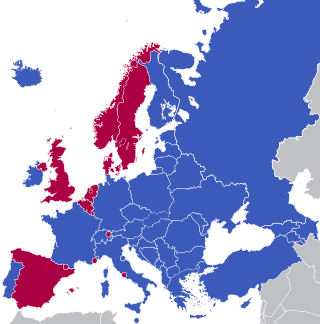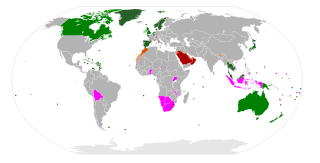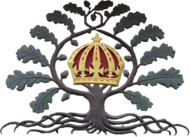A monarchy is a form of government in which a person, the monarch, reigns as head of state for life or until abdication. The extend of the authority of the monarch may vary from restricted and largely symbolic, to fully autocratic, and may have representational, executive, legislative, and judicial functions.
A Tory is an individual who supports a political philosophy known as Toryism, based on a British version of traditionalist conservatism which upholds the established social order as it has evolved through the history of Great Britain. The Tory ethos has been summed up with the phrase "God, King, and Country". Tories are monarchists, were historically of a high church Anglican religious heritage, and were opposed to the liberalism of the Whig party.
A posthumous name is an honorary name given mainly to revered dead people in East Asian culture. It is predominantly used in Asian countries such as China, Korea, Vietnam, Japan, and Thailand. Reflecting on the person's accomplishments or reputation, the title is assigned after death and essentially replaces the name used during life. Although most posthumous names are given to royalty, some posthumous names are given to honour significant people without hereditary titles, such as courtiers or military generals.
In political science, a reactionary or a reactionist is a person who holds political views that favor a return to the status quo ante—the previous political state of society—which the person believes possessed positive characteristics that are absent from contemporary society. As a descriptor term, reactionary derives from the ideological context of the left–right political spectrum. As an adjective, the word reactionary describes points of view and policies meant to restore a status quo ante.

Henri, Count of Chambord and Duke of Bordeaux was the Legitimist pretender to the throne of France as Henri V from 1844 until his death in 1883.

Orléanist was a 19th-century French political label originally used by those who supported a constitutional monarchy expressed by the House of Orléans. Due to the radical political changes that occurred during that century in France, three different phases of Orléanism can be identified:
The abolition of monarchy is a legislative or revolutionary movement to abolish monarchical elements in government, usually hereditary. The abolition of an absolute monarchy in favour of limited government under a constitutional monarchy is a less radical form of anti-monarchism that has succeeded in some nations that still retain monarchs, such as Sweden, Spain, and Thailand.

Loyalism, in the United Kingdom, its overseas territories and its former colonies, refers to the allegiance to the British crown or the United Kingdom. In North America, the most common usage of the term refers to loyalty to the British Crown, notably with the loyalists opponents of the American Revolution, and United Empire Loyalists who moved to other colonies in British North America after the revolution.

The French Revolution of 1830, also known as the July Revolution, Second French Revolution, or Trois Glorieuses, was a second French Revolution after the first in 1789. It led to the overthrow of King Charles X, the French Bourbon monarch, and the ascent of his cousin Louis Philippe, Duke of Orléans. After 18 precarious years on the throne, Louis-Philippe was overthrown in the French Revolution of 1848.

The Legitimists are royalists who adhere to the rights of dynastic succession to the French crown of the descendants of the eldest branch of the Bourbon dynasty, which was overthrown in the 1830 July Revolution. They reject the claim of the July Monarchy of 1830–1848 which placed Louis Philippe, Duke of Orléans, head of the Orléans cadet branch of the Bourbon dynasty, on the throne until he too was dethroned and driven with his family into exile.

A pretender is someone who claims to be the rightful ruler of a country although not recognized as such by the current government. The term may often be used to either refer to a descendant of a deposed monarchy or a claim that is not legitimate.
The Ultra-royalists were a French political faction from 1815 to 1830 under the Bourbon Restoration. An Ultra was usually a member of the nobility of high society who strongly supported Roman Catholicism as the state and only legal religion of France, the Bourbon monarchy, traditional hierarchy between classes and census suffrage, while rejecting the political philosophy of popular will and the interests of the bourgeoisie along with their liberal and democratic tendencies.
During the Bourbon Restoration (1814–1830) and the July Monarchy (1830–1848), the Doctrinals were a group of French royalists who hoped to reconcile the monarchy with the French Revolution and power with liberty. Headed by Royer-Collard, these liberal royalists were in favor of a constitutional monarchy, but with a heavily restricted census suffrage—Louis XVIII, who had been restored to the throne, had granted a Charter to the French with a Chamber of Peers and a Chamber of Deputies elected under tight electoral laws. The Doctrinaires were a centrist, as well as a conservative-liberal group, but at that time, liberal was considered to be the mainstream political left, so the group was considered a centre-left group.

Jean Maximilien Lamarque was a French general of the French Revolutionary Wars and the Napoleonic Wars who later became a member of the French Parliament. Lamarque served with distinction in many of Napoleon's campaigns. He was particularly noted for his capture of Capri from the British, and for his defeat of Royalist forces in the Vendée in 1815. The latter campaign received great praise from Napoleon, who said Lamarque had "performed wonders, and even surpassed my hopes".

In the European history, monarchy was the prevalent form of government throughout the Middle Ages, only occasionally competing with communalism, notably in the case of the maritime republics and the Swiss Confederacy.

Monarchism in France is the advocacy of restoring the monarchy in France, which was abolished after the 1870 defeat by Prussia, arguably before that in 1848 with the establishment of the French Second Republic. The French monarchist movements are roughly divided today in three groups:
- The Legitimists for the royal House of Bourbon,
- the Orléanists for the cadet branch of the House of Orléans, and
- the Bonapartists for the imperial House of Bonaparte

Monarchism is the advocacy of the system of monarchy or monarchical rule. A monarchist is an individual who supports this form of government independently of any specific monarch, whereas one who supports a particular monarch is a royalist. Conversely, the opposition to monarchical rule is referred to as republicanism.

The Royalist Party, officially the Society for Monarchical Constitutionalism, was a monarchist political party and militant organization active in China during the early Republican Era. Supported by the Empire of Japan, its members sought to restore the Chinese monarchy under the Qing dynasty by launching insurgencies and advocating the secession of Manchuria and Inner Mongolia from the rest of China. Although it largely lacked a firm structure and consisted of loosely tied factions, the Royalist Party played a major role in Chinese politics during the 1910s.












